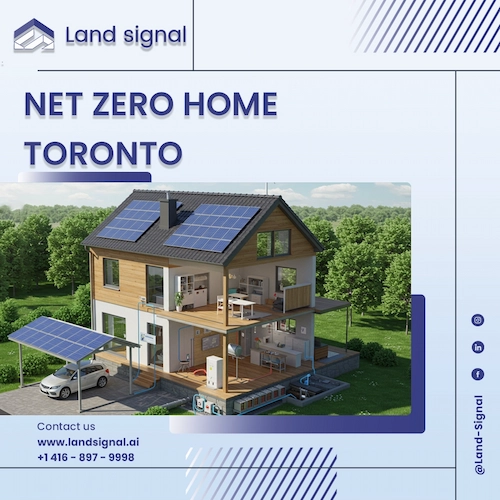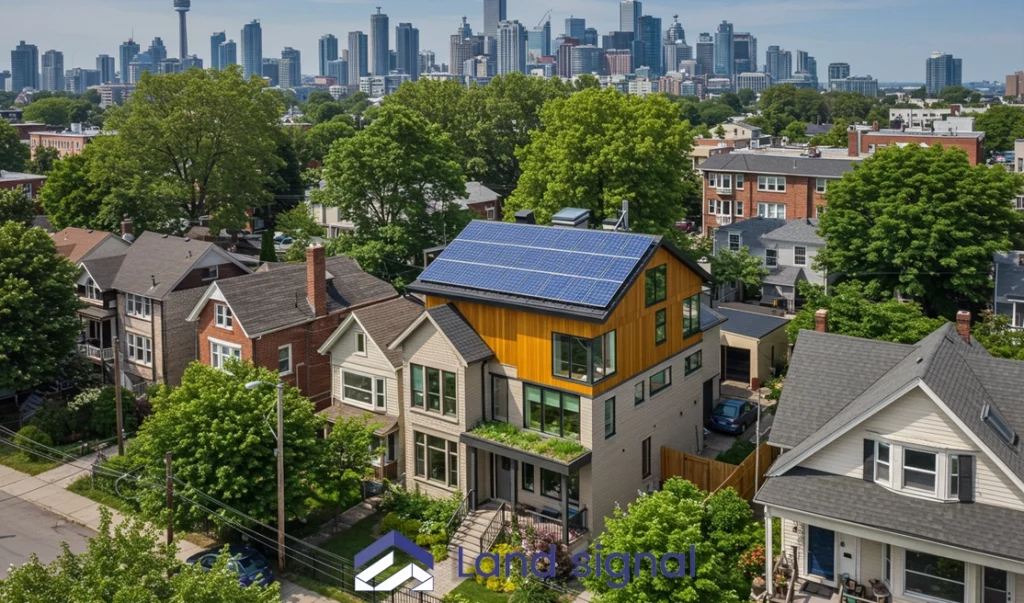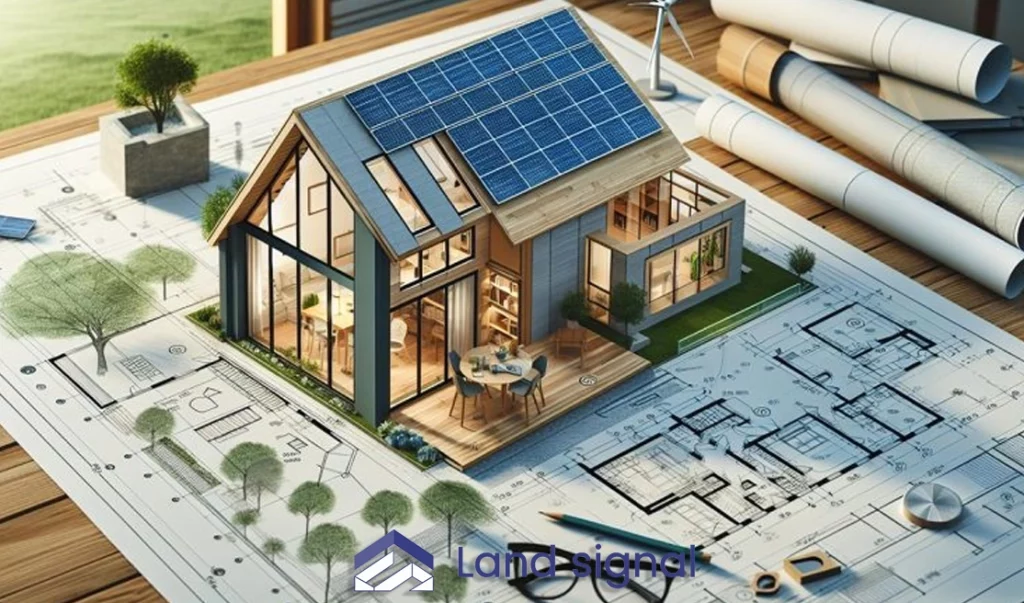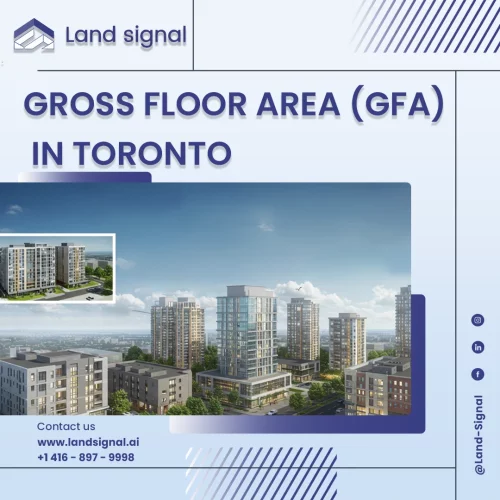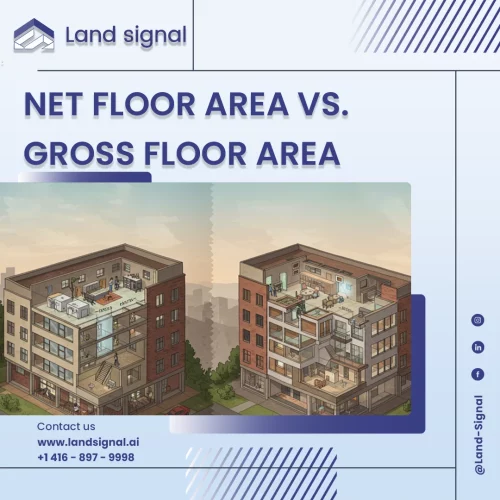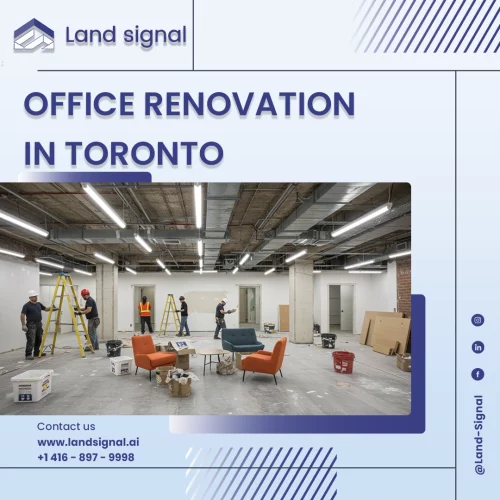The concept of sustainable living has gained significant traction in recent years, driven by growing environmental concerns and the increasing cost of traditional energy sources. Within this context, net-zero homes have emerged as a viable and increasingly popular solution for environmentally conscious homeowners seeking to minimize their ecological footprint while enjoying long-term cost savings and enhanced comfort.
If you’re considering a net zero home, renovation, garden, or laneway suite, Land Signal is your trusted partner in Ontario and the GTA. We specialize in obtaining home building permits Toronto and renovation permits, as well as designing and building energy-efficient homes that meet sustainable living goals. Our team of experts will streamline the process, ensure compliance with local regulations, and help you achieve your vision.
This article provides a comprehensive overview of net zero home Toronto, exploring their definition, significance, operational principles, benefits, costs, and the crucial aspects of design and construction. By understanding the intricacies of net-zero home development, prospective homeowners can make informed decisions about embracing this sustainable building approach and contributing to a greener future for Toronto.
Free Estimate for Your Home Project
Land Signal makes the process seamless by providing accurate cost estimates and expert consultation to bring your vision to life.
What is a Net Zero Home Toronto?
A Net Zero Home Toronto, adhering to the Canadian Net Zero Home standard, is a residential building designed and constructed to produce as much energy as it consumes annually. This balance is achieved through a combination of energy-efficient design and construction practices, coupled with the integration of renewable energy generation systems, typically solar photovoltaic (PV) panels.
The home’s energy consumption is carefully monitored and managed to ensure that the energy produced on-site offsets the energy used for heating, cooling, lighting, appliances, and other household needs.
This equilibrium results in a net-zero energy balance, effectively eliminating the home’s reliance on grid-supplied electricity from fossil fuel sources and significantly reducing its carbon footprint. The Net Zero Home labeling program, administered by the Canadian Home Builders’ Association (CHBA), provides a standardized framework for certifying net-zero homes, ensuring they meet rigorous energy performance criteria.
The Importance of Net Zero Home Toronto
Net-zero homes play a crucial role in advancing Toronto’s sustainability goals and addressing the challenges of climate change. The city’s commitment to reducing greenhouse gas emissions and promoting energy efficiency aligns perfectly with the principles of net zero home construction. By minimizing reliance on fossil fuels and promoting the adoption of renewable energy sources, net-zero homes contribute significantly to reducing the city’s overall carbon footprint.
Furthermore, these homes enhance the resilience of the city’s energy infrastructure by reducing demand on the electrical grid, particularly during peak periods. The widespread adoption of net-zero homes can transform Toronto’s housing sector into a model of sustainable development, contributing to a healthier and more environmentally responsible urban environment.
How Do Net Zero Home Toronto Operate?
Net-zero homes achieve their energy balance through a synergistic interplay of energy production and energy efficiency. This delicate balance is carefully orchestrated through advanced monitoring and management systems that optimize energy generation and consumption patterns.
Energy Production
The primary source of energy production in net-zero homes is typically solar photovoltaic (PV) panels installed on the roof or other suitable locations. These panels convert sunlight into electricity, which can be used to power the home’s various systems and appliances.
Other renewable energy sources, such as wind turbines or geothermal systems, may also be incorporated depending on the property’s characteristics and local regulations. The energy generated on-site is either used directly or fed back into the electrical grid through net metering programs, offsetting the home’s energy consumption during periods when renewable energy generation is insufficient.
Energy Efficiency
Achieving net-zero energy performance requires meticulous attention to energy efficiency in every aspect of the home’s design and construction. This includes utilizing high-performance insulation, airtight construction techniques, energy-efficient windows and doors, and optimized HVAC systems.
The building envelope is carefully designed to minimize heat loss during winter and heat gain during summer, reducing the energy required for heating and cooling. Energy-efficient appliances and lighting fixtures further minimize energy consumption, contributing to the overall net-zero energy balance.
Monitoring and Management
Sophisticated monitoring and management systems play a crucial role in optimizing energy performance in net-zero homes. These systems track energy production and consumption patterns, providing real-time data on energy usage and identifying areas for potential improvement.
Smart home technologies allow homeowners to control and automate various energy-consuming systems, such as lighting, heating, and cooling, further optimizing energy efficiency and minimizing waste. These intelligent systems ensure that the home operates at peak energy performance, maintaining the delicate balance between energy production and consumption.
Benefits of Net Zero Home Toronto
Net-zero homes offer a multitude of benefits, encompassing environmental, financial, health, and lifestyle advantages. These benefits make net-zero homes an attractive option for homeowners seeking a sustainable, cost-effective, and comfortable living environment.
Environmental Benefits
The most significant benefit of net-zero homes is their positive impact on the environment. By eliminating reliance on fossil fuels and promoting the use of renewable energy, these homes significantly reduce greenhouse gas emissions, contributing to the fight against climate change. The reduced carbon footprint of net-zero homes helps mitigate the environmental impact of residential buildings, promoting a more sustainable urban environment.
Financial Benefits
Net zero home Toronto offers substantial long-term cost savings through reduced energy bills. By generating their own electricity, homeowners can significantly reduce or eliminate their reliance on grid-supplied electricity, resulting in lower monthly energy expenses. These savings can accumulate over time, offsetting the initial investment in renewable energy systems and energy-efficient technologies.
Enhanced Comfort and Indoor Air Quality
Net-zero homes are designed and constructed to provide superior comfort and indoor air quality. High-performance insulation and airtight construction techniques minimize drafts and temperature fluctuations, creating a more consistent and comfortable indoor environment. Improved ventilation systems ensure a constant supply of fresh air, reducing indoor air pollutants and promoting a healthier living environment.
Energy Independence and Resilience
Net zero home Toronto offers greater energy independence and resilience, reducing reliance on the electrical grid. This independence can be particularly valuable during power outages or grid disruptions, ensuring that the home remains functional and comfortable even when grid-supplied electricity is unavailable. This resilience enhances the security and reliability of the home’s energy supply.
Lower Maintenance Requirements
Net-zero homes often require less maintenance compared to traditional homes. High-quality, durable materials and energy-efficient systems minimize the need for frequent repairs or replacements. This reduced maintenance burden translates to lower long-term maintenance costs and less time spent on upkeep.
Higher Resale Value
Net-zero homes are increasingly desirable in the real estate market, commanding higher resale values compared to traditional homes. The growing demand for sustainable and energy-efficient homes makes net-zero homes an attractive investment for environmentally conscious buyers. This increased resale value can provide a significant return on investment for homeowners.
Healthier Living Environment
The improved indoor air quality and consistent temperatures in net-zero homes contribute to a healthier living environment. Reduced exposure to indoor air pollutants and allergens can improve respiratory health and overall well-being. The comfortable and consistent indoor environment can also reduce stress and promote better sleep quality.
Cost of Net Zero Home Toronto
Building a net zero home Toronto typically involves higher initial costs compared to conventional construction. However, these upfront investments are offset by long-term energy savings and other financial benefits.
Initial Costs
The initial costs of building a net-zero home can vary depending on the size, design complexity, materials used, and the specific technologies incorporated. The cost of installing renewable energy systems, such as solar PV panels, and implementing energy-efficient building practices can contribute to higher upfront expenses. However, various incentives and rebates are available to offset these initial costs, making net-zero homes more financially accessible.
Long-Term Savings
The long-term cost savings associated with net-zero homes can be substantial. Reduced energy bills, lower maintenance costs, and increased resale value can all contribute to significant financial benefits over the lifespan of the home. These long-term savings can outweigh the initial investment, making net-zero homes a financially sound investment.
Read Also: Home Building Cost Calculator Ontario
Designing and Building a Net Zero Home Toronto
Designing and building a net-zero home requires careful planning, meticulous attention to detail, and collaboration with experienced professionals. The process involves integrating various design principles, technologies, and construction techniques to achieve optimal energy performance and minimize environmental impact.
Choosing the right team of builders and architects is crucial for a successful net-zero home project. Homeowners should thoroughly research and interview potential candidates, ensuring they possess the necessary expertise and experience in net-zero home design and construction.
Key Design Principles
Passive solar design
Orienting the home to maximize solar gain during winter and minimize heat gain during summer. This involves carefully considering the home’s orientation relative to the sun’s path, strategically placing windows and shading devices to optimize solar heat gain in the winter while minimizing overheating in the summer.
Properly implemented passive solar design can significantly reduce the need for active heating and cooling systems, contributing to the home’s overall energy efficiency. This design principle also enhances natural daylighting, reducing the need for artificial lighting.
High-performance insulation and airtightness
Creating a highly insulated and airtight building envelope to minimize heat transfer and reduce energy loss. This involves using advanced insulation materials and meticulous construction techniques to seal any gaps or cracks in the building envelope. A well-insulated and airtight home minimizes heat loss during winter and heat gain during summer, reducing the energy required for heating and cooling. This also contributes to improved indoor comfort and reduced drafts.
Essential Technologies
Solar panels and renewable energy sources
Integrating solar PV panels or other renewable energy systems to generate electricity on-site. Solar panels are the most common renewable energy technology used in net-zero homes, converting sunlight into electricity that can power the home’s various systems and appliances.
Other renewable energy sources, such as wind turbines or geothermal systems, may also be considered depending on the property’s characteristics and local regulations. The size and type of renewable energy system will depend on the home’s energy needs and the availability of renewable resources.
Energy-efficient HVAC and appliances
Utilizing high-efficiency heating, cooling, and ventilation systems, as well as Energy Star certified appliances. High-efficiency HVAC systems minimize energy consumption while providing optimal heating and cooling performance.
Energy Star certified appliances consume less energy than conventional appliances, further reducing the home’s overall energy footprint. Selecting energy-efficient appliances and HVAC systems is crucial for achieving net-zero energy performance.
Finding the Right Builders and Architects
Working with certified net zero home Toronto builders
Choosing builders with experience and expertise in net-zero home construction. Certified net zero home Toronto builders have demonstrated their competency in designing and constructing homes that meet the rigorous standards of net-zero energy performance. Their expertise ensures that the home is built to the highest energy efficiency standards and incorporates the necessary technologies and design principles. Working with a certified builder gives homeowners confidence in their net-zero home’s quality and performance.
Land Signal can help simplify the process by guiding you through permits and connecting you with experienced professionals to bring your vision to life.
Questions to ask before starting your project
Thoroughly researching and interviewing potential builders and architects, asking detailed questions about their experience, qualifications, and approach to net-zero home design and construction. It’s crucial to inquire about their specific experience with net-zero homes, their understanding of relevant building codes and regulations, and their approach to integrating sustainable design principles and technologies. Asking detailed questions helps homeowners select the most qualified and experienced professionals for their projects.
Conclusion
Net Zero Home Toronto represents a significant advancement in sustainable residential construction, offering a viable pathway to reducing environmental impact, lowering energy costs, and enhancing living comfort. By embracing the principles of energy efficiency and renewable energy generation, net-zero homes contribute to a more sustainable future for Toronto and provide homeowners with numerous financial, health, and lifestyle benefits.
While the initial costs may be higher than conventional construction, the long-term advantages of net-zero homes make them a compelling investment for environmentally conscious homeowners seeking a sustainable and rewarding living experience.

